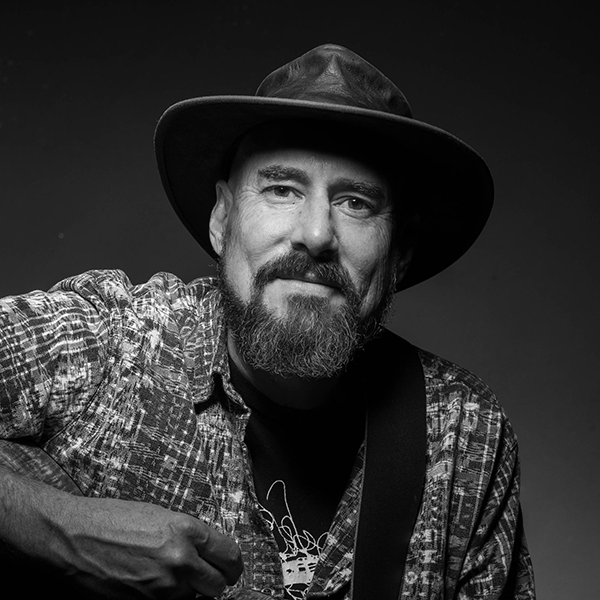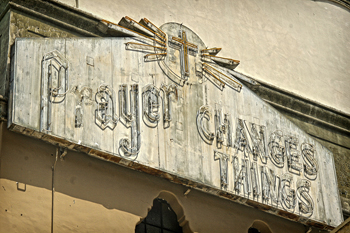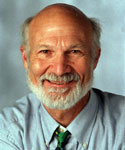Editor’s note: Faith & Leadership offers sermons that shed light on issues of Christian leadership. The Rev. Samuel Wells preached this sermon on November 27, 2011, at Duke University Chapel.
Have you ever known what it means to be hungry? It starts as a sense of appetite, a feeling that you could really do with a bit of something, maybe a snack. And then it grows, and if you’ve got no way of finding a mouthful or a whole meal, you begin to feel your own fragility -- an ache in the stomach, your concentration beginning to waver.
And it starts to be difficult to do ordinary things, so you begin to seek out distractions -- something absorbing that takes your attention away and enables you to lose yourself. You start to doubt your own judgment, and you realize you’re becoming incredibly selfish, because you find yourself so mesmerized by your own desperation that you can’t consider the needs of anyone else.
And when finally you do find food, it can be that your yearning and ache for the pain to go away is so great that you don’t truly enjoy the food or savor its taste or texture. You greedily wolf it down, because your body’s taken over and the rest of you has been elbowed aside. Hunger’s drained all the joy, and you’re left with raw, voracious compulsion.
We don’t want to see ourselves like this. It’s not just the physical discomfort. It’s the discovery that we can be so needy, so selfish, so consumed by one thing to the exclusion of all else. And we certainly don’t want anyone else to see us like this. How humiliating for others to realize the narrow, precarious, craven creatures we can be. What a loss of dignity. If someone saw us like this, we could hardly be in their presence again -- not just because they would think so little of us, but because as soon as we saw them, we’d be reminded of a place of need in ourselves we’d much rather suppress or forget.
Hunger may be the most basic of our human needs and desires. But more often, it’s a metaphor for other longings that can take over our life. I wonder if you know, for example, what it’s like to yearn to have a life partner. Your life has good and rewarding things in it, but deep down you just profoundly want to matter to another creature, to have a commitment and a relationship to build your life around, to shape meaning out of the rhythms and texture of your days and the movements and achings of your heart, and perhaps most of all to make something beautiful together to leave as a legacy on planet Earth and feel your life has been at least somewhat fruitful.
But year follows year and there’s no genuine sign of your being in any potentially permanent relationship. Your plans for your career, and your financial planning, which had always been provisional, begin to take on an unexpected air of permanence. You come to wonder if anyone will ever find you attractive, if maybe you’re hanging out in the wrong places, or if you’re just being too choosy.
Before you know it, the waiting takes a grip over your mind and soul and becomes as convulsive as hunger. Your radar screen can’t help but flash sirens when it picks up nearby people with vibrant marriages, designer children and imagined happiness; and you begin to avoid conversation with them and withdraw from their company, lest your need and grief turn into sharp words, inappropriate tears and blinding self-pity. You don’t want other people to see you like this. You can’t bear to see yourself like this.
Of course, these are only among the most intense of many profound yearnings that can’t be assuaged by material comfort or professional accomplishment. Right now, 1 in 10 people are longing for a job, and a great many more are yearning for a job that they can truly pursue with their heart and soul. Look to your left; look to your right: you’re likely to see someone who’s waiting, been waiting a long time.
Not long ago, I sat down with a young man called Jeff who’d lost his beloved and only sister in a tragic accident. What made the tragedy so poignant was that the man responsible for the accident, Andrew, was a close friend of both Jeff and his sister. Even worse, Andrew’s own brother had also died in the same accident. The four friends had been traveling together.
It would have been great in many ways if Jeff and Andrew could’ve sat down together and talked through the events of that day and shared their grief and loss. But Jeff told me he just couldn’t do that.
“I know I should, and I know I must, but I’m sorry, I just can’t bring myself to forgive him. I know in my head he’s hurting for his brother as much as I am for my sister, but he’s not missing my sister like I do. No one is. No one knows how important she was to me. I just can’t forgive him, and I just can’t face him.”
I asked, “D’you think one day you will?”
Jeff said, “I know one day I’ve got to, because this hatred is just eating me up, and I can’t think about anything else. Until I can forgive, I won’t be able to start living again. But I’m not there yet -- nothing like there yet. And I think it’s going to be a while.”
All waiting is a kind of hunger. All hunger is a kind of waiting. You can fill up your life with good and worthwhile things, genuine and valuable tasks, absorbing and deserving projects, admirable and interesting people; but suddenly, you get moments when you see with piercing clarity that it’s all a distraction, all a way of making you so busy that you don’t need to think about the one thing you desire above all else, and long for with your whole being, and need like a hungry hole in your stomach.
You can deal with waiting through distraction, through busyness and fluster and hurry and entertainment; but when all your distractions have expired, the waiting’s still there for you, gnawing at your soul like a hungry dog growling and pawing at the back door.
We live in a society increasingly clothed in technology. Technology seduces us because it zeroes in on every single problem and frustration of our life and promises to fix it. Struggling with your hip? Here’s an artificial one. Not sure what clothes to pack for your trip to New England for the holidays? This little device can predict the temperature in Boston for the next week. Ready for supper and not had time to go to the store? This oven can bake things straight from the freezer. Longing to be asked out on a date? Here’s a website with lots of interesting-sounding lonely hearts, every one of them emotionally intelligent but astonishingly baggage-free.
Once we’ve become accustomed to expecting technology to resolve the unfulfilled or unresolved parts of our lives, waiting becomes even harder than it was before. It doesn’t just seem distressing -- it seems outrageous, because surely someone, somewhere, must have invented a solution to this problem. We look around us and see everyone else apparently finding solutions to their problems, and it makes our waiting seem monstrously unjust. So as often as not, we’ll look to technology, because even if it can’t end our waiting, it can at least provide ever more sophisticated forms of distraction. After all, who needs to feel the pain of sitting by the bedside of a sick loved one if you can pick up the remote control and, at the flick of the red button, be able to watch any one of four football games, each chock-full of passion, drama, skill and controversy?
Back in the days when it was common to go into a tailor’s store and ask for yards of cloth for sewing or dressmaking into trousers or skirts or outer garments, people would imitate the proverbial salesperson and say, “Never mind the quality -- feel the width!”
In other words, “Who cares whether the material comes from the very best fabric? See how much there is of it, for such a bargain price!”
It’s a parable for what we do to our lives to hide ourselves from the depths of our struggles and sadness and pain. “Never mind our deepest desires -- see how easy it is to occupy ourselves with our trivial ones! Don’t distress yourself about the things that really matter -- see how quickly you can get your hands on the things that don’t!”
It’s perfectly possible to turn your whole life into a distraction, a whole enterprise of feeling the width. Maybe that’s what you’re doing right now.
The church has a season for helping us set aside our distractions and get profoundly in touch with the powerlessness of waiting. It’s called Advent. In Advent, we dismantle our elaborate defenses and, for a few weeks, or days, or moments, face up squarely to our deepest yearnings, our unresolved longings and our rawest needs. But Advent is also about a confidence deeper than our needs, a hope more far-reaching than our desires, a future more comprehensive than our most poignant yearnings.
In our self-protection, we habitually say to ourselves, to one another and even to God, “Never mind the quality; feel the width. Let’s just make ourselves busy and perhaps we’ll forget about it.” In Advent, God says to us, “Never mind the width. Your life isn’t about quantity of activity or length of days. Let go of the width. Feel the depth.”
The answer to the agony of waiting isn’t width. It’s depth. Just this once, in this Advent moment, feel the depth of your life, and look into the deep heart of God.
Look at your hands. Think of the Father’s hands, that made the world; think of the Son’s hands, and the nail marks in the center of them; think of the Spirit’s hands, and realize they’re the hands you’re looking at right now.
Look at your feet. These are feet that can walk with others in their pain; these are feet that can dance to the beat of God’s heart; these are feet that can run with the wind of God’s Spirit.
Feel your skin. Skin that Christ took on, skin that can touch the tender suffering of another, skin that’s made to protect and stretch the boundary of your being. Feel the depth.
Advent says, “Yes, you’re hungry. Yes, you long for fulfillment and resolution and completion and consummation. Yes, you’re aching all over; yes, if you stopped your incessant activity and paused for one second to look in the mirror, you’d be sobbing with disappointed dreams and deflated desires and unmet longings and dashed aspirations. Yes, life hasn’t turned out as you trusted it would; yes, it feels like everyone else has it easier than you; yes, it’s sometimes impossible to find the patience to keep going; yes, you feel if you for one moment admitted your grief, it would crush you and incapacitate you and disable you from functioning in any respectable and grown-up and self-effacing way.”
Advent goes to the bottom of our waiting. But Advent doesn’t stop there. Advent goes under and around our waiting.
Advent also says, gently, cherishingly and tenderly, “No. No, this isn’t the way the story ends. No, God isn’t ignoring you or punishing you. No, this isn’t God’s last word on the matter. No, God hasn’t finished with you. No, this groaning, this aching, this longing won’t be your eternal condition. God came in Christ to be with you, to groan with your groan, to ache with your ache, to yearn with your yearning. God in Christ suffered on the cross to show you a yearning that is greater even than your yearning, a grief that is greater even than your grief, a longing that is greater even than your longing -- a longing for you.
“Christ rose from the dead to show you how the story ends, that all your pain and agony and tears will be taken up into glory, that all your sadness will be made beautiful, and all your waiting will be rewarded. Christ ascended into heaven to show you that you’ll spend eternity with God, that your hunger will be met in God’s banquet, that everything you long for will be exceeded and overwhelmed in the glory of the presence of God, and that when you see the marks in Christ’s hands and the Father’s broken heart, you’ll finally realize how achingly, convulsingly hungry God has always been for you.”
Just for this moment in Advent, dare to feel the depth. Never mind the width. If you’re tired of waiting, go deeper. Feel the deep texture of life. Eternal life isn’t an infinitely extended version of what we have now; it’s a deeper version of what we have now. If you want a glimpse of eternal life, even amid the sadness and the longing of waiting, go deeper.
Remember all those people you were envious of and who seemed to have everything you didn’t have? Go deeper and see who they really are and what they truly long for, and feel your jealousy begin to melt into compassion. Go deeper into your fears and come out of the bottom of them, and let your hatred become hope. Go deeper into your loneliness, and make a companion of the truth you find there. Feel the wonder of your createdness; sense the unlikely mystery of your being here at all. And receive all the rest as a bonus, a gift, a blessing.
Advent isn’t an escape. It’s an encounter with the time that’s deeper than our time, a time we call eternal life. It’s a discovery of a longing that’s deeper than our longing, the longing we call God’s waiting for us. It’s an experience deep down and through the bottom of our experience, a place where grief is no longer isolating but companionable, where alienating hurt becomes tender wisdom, where unfulfilled longing becomes the sculpting of a greater hole for grace.
It’s hard to do Advent all year round. It’s almost easier to be left alone in our waiting. But just this once, this Advent, take the risk on God that God’s taken on you. Feel the quality. Feel the depth. Go deeper and keep digging. Keep digging until you find you’ve dug deep into the heart of God.













